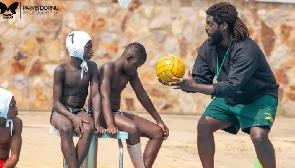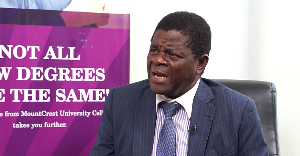Prince Asante Sefa-Boakye has frequently found himself to be the only African American player, and one of very few players of colour, in a water polo pool.
The 31-year-old, who grew up in Coronado, California, is now taking on a new challenge by introducing the sport to his father's homeland.
Asante is currently training and working with players in Ghana to create the first-ever 'all-Black’ water polo team to compete at the Olympics.
“My reality of being this foreign player as a minority player is beginning to wash away with this new Black Star polo initiative," the former American pro water polo player said in an interview with Olympics.com from Accra.
“Seeing the Africans on the main stage for water polo, is a big dream of mine.”
The American-born Ghanaian has seen his dream of promoting water polo in the African county grow significantly since he first introduced the sport to a local school in 2018.
Today, he oversees a seven-team national league that operates under the Awutu Winton Waterpolo Club.
His programme is also sparking the promotion of the aquatic discipline in Africa.
To date, only two African countries, South Africa and Egypt, have had the opportunity to field men's water polo teams at the Olympics.
Asante vividly remembers the first time he set up a water polo scrimmage at a school in the west African nation. With no goal nets available, he improvised by using a soccer bench and two chairs placed at either end of the pool.
The kids in caps were thrilled to be able to tread and shoot balls. “It was a beautiful mess!” he recalled of the Ghanaian youngsters' first proper attempt at a water polo game.
“I was happy to have been met with such enthusiasm, enjoying this new sport. Ghanaians and Africans, we're just very competitive by nature and once we get something, we stick to it.”
A wonderful turning point for the sport, that was a hard sell initially in Ghana.
Swimming, a fundamental skill for water polo, is not widely practised despite a quarter of Ghana’s 32 million people living along the 550-kilometre coastline.
Most of the locals are terrified of swimming in the ocean or open water.
Whenever Asante, who played collegiate water polo at California Lutheran University and played for teams across Europe and Brazil, would train in the deep waters, it sparked panic.
The fear focussed on the possibility of drowning in the Gulf of Guinea that is part of the eastern tropical Atlantic Ocean, known for its strong and dangerous rip currents.
“I would do runs and runs of long-distance swimming. I leave and people are shouting, crying, just chaos. And then when I come back, the jaws are all dropped to the floor,” said Prince looking back at his early days visiting Ghana.
“Because the reality is nobody comes back, and I'm the one that came back. And that's just what shocked everybody. Then it got to the point where they said, ‘wait a second, if this guy that looks like me can do it, maybe there's a chance that I can do the same thing’. And it went from one person going on to the ocean to swimming to two, to three, to six to eight.”
According to a recent research conducted by Kwame Nkrumah University of Science and Technology (KNUST), Ghana has recorded nearly 1,500 drowning cases in the past three years.
Prince Asante on helping Ghanaians overcome stigma around water
When the former professional water polo player introduced the sport to Ghana in 2018, he was reminded of a familiar social stigma that he had experienced before.
“You don't see the pool filled with Black Africans swimming and having a good time, you don't,” Prince added disappointedly.
“We have the Michael Jordan, the LeBron James, the Kobe Bryant, Serena Williams; we have the Tiger Woods, but when it comes to water sports, we don't have many or anybody to look up to.”
In 2001, Genai Kerr broke new ground as the first Black American athlete to compete at a men's water polo World Championship.
Three years later at the Athens 2004 Olympics, he and Omar Amr made history as the first Black players to feature for a U.S. Olympic water polo team.
However, it wasn't until Rio 2016 that Ashleigh Johnson shattered another barrier by becoming the first Black woman to make the U.S. water polo team.
The odds were stacked against him, but he was hopeful.
“There are already so many cultural connections between the water and opportunities that keep them away from swimming and participating in aquatic sports,” said the San Diego native.
The resounding success of water polo in Ghana
Prince admits to being overwhelmed by the response to water polo amongst boys and girls in Ghana.
He started by focusing on schools that had swimming facilities but has since expanded his reach.
“The majority of the ages are from about 16 to 25. That's our biggest pool. And then we have some younger kids, probably from about seven to 7 to 13,” said Prince, who also has a thriving career as a musician.
“Some kids live by the streets. Some kids go to a free high school. Some kids are university athletes. Some kids whose parents are fishermen live by the lake or sea.”
The dream, rooted in the belief of a more diverse and inclusive sport, has now blossomed into a national league with seven teams, which started in January 2022.
An even more significant aspect is that the growth of water polo, one of the oldest Olympic team sports, has served as a catalyst for promoting the sport not only in Ghana but also throughout sub-Saharan Africa and beyond.
“It’s just a small seed that I've been planting. There are some schools in Kenya that have been able to be a part of it. I was able to do a club practice in Ethiopia, in the Bahamas, they have water polo too. It’s like, ‘hey look at what this guy is doing!’ it kind of puts a fire under them saying, ‘what do you mean? We're doing the same thing too.' So it’s a win-win across the board.”
And with the growing interest in water polo and and the distribution of several donated inflatable goalposts throughout the country - a significant improvement from the initial use of football benches and wooden goalposts - Prince Asante feels that he is on the right track.
“My main goal was to create the interest, the demand, and then once the demand is there, we can work on creating this infrastructure. But the way these kids have progressed and the way they are serious about it and the way they have a passion for it is an indicator that water polo could very well be a national sport of Ghana, because we're a coastal country.”
The growth is fuelling his bigger ambition, ‘An all Blacks' team at his home Olympics at Los Angeles 2028.
“My short-term vision, which started as a joke, is to make an all Blacks water polo team. I want to see Ghana at the Olympic Games representing for water polo and not just to solely represent the continent, but to also be competitive.”
“The talent is there, the passion is there,” he continued of his largely self-funded initiative, which now has nearly 85 athletes guided by 10 local coaches.
He’s also garnered support from double Olympic gold medallist Bradley Schumacher.
“But the bigger picture is that a lot of these kids come from generations of fishermen, families. Their father was a fisherman, their grandfathers, or they'll be a fisherman, and they've never done anything else. Now they have that skill along with the sport that can take them to a university, to a school, take them abroad.”

















